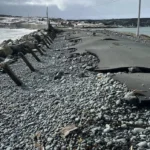[ad_1]
NPR’s Debbie Elliott speaks to Aaron David Miller, a former State Division Center East analyst and negotiator, about what Israel’s strikes on Iranian nuclear and army websites imply for the area.
DEBBIE ELLIOTT, HOST:
Israel and Iran traded army strikes in a single day as tensions escalate between the 2 international locations. Israel struck first on Friday, native time, concentrating on a spread of army and nuclear websites inside Iran, killing a number of prime safety chiefs. Iranian state media report that subsequent strikes hit residential buildings within the capital metropolis of Tehran. A barrage of Iranian ballistic missiles focused Israeli cities in a single day, together with Tel Aviv, hanging a number of websites there. Israel’s protection minister warned that except the missile assaults cease, then, quote, “Tehran will burn.” Aaron David Miller is a former State Division Center East analyst and negotiator. He’s now senior fellow on the Carnegie Endowment for Worldwide Peace and is with us this morning. Good morning.
AARON DAVID MILLER: Morning, Debbie. Thanks for having me.
ELLIOTT: So let’s begin with what you make of the developments in a single day.
MILLER: I imply, I feel it is – the headlines, Debbie, are going to be the pattern strains for the foreseeable future. The Israelis have established escalation dominance within the air. They spent two hours this morning hanging targets in and round Tehran. And I think these strikes are going to proceed, each towards Iran’s typical websites, its ballistic missiles, its UAVs, its drones and its ballistic missile manufacturing services. And although after a day and a half, the Israeli assaults on the nuclear web site appear to not been the important thing precedence, I feel it will assume a better significance within the days forward.
ELLIOTT: So let’s speak somewhat bit about Iran’s nuclear services. What does this battle imply for the nation’s nuclear program?
MILLER: , it – the Iranians have invested over time $5 trillion on this nuclear program, and so they’ve chosen to stay a screwdriver’s flip away from a nuclear weapon. It provides them regional attain. It provides them resonance. It makes them central to the dialog – the truth of Center East. They’ve chosen to not weaponize. However as they’ve enriched uranium, as there’s superior centrifuges proceed to spin, because the stockpile of extremely enriched uranium grows, the hazard of getting into what one Israeli described as a zone of immunity through which it doesn’t matter what the Israelis would do, Iran’s capability to weaponize comparatively rapidly – to illustrate, inside a yr – to truly produce a weapon, they want a physics package deal. They should miniaturize the warhead. They should ship it.
It is grow to be a program of nationwide status, and maybe now that the Israelis have tried to eradicate it – it will be very laborious – it might really incentivize, assuming the regime, assuming it is steady and continues to outlive, to truly go for a nuclear weapon. So there isn’t any good answer to this with the exception – and I am not recommending this. I want it might occur, however I feel it’s extremely laborious to do – a brand new Iranian regime that’s much less acquisitive and would not need or want a nuclear weapon. And that is – that, to me, is a great distance away.
ELLIOTT: Now, Israeli Prime Minister Benjamin Netanyahu has mentioned that the army operation will final so long as it takes. He is additionally calling on Iranians to stand up towards their regime. What’s Israel’s endgame right here?
MILLER: It is a actually good query. , 18 months on after October 7, the prime minister needs complete victory in Gaza. So I would argue to you {that a} managed stage of escalation battle is sweet for his politics. However what does he need in Iran? Complete victory would imply the decimation and the eradication of Iran’s nuclear program. Israeli army capability, nonetheless extraordinary it has been – and it is demonstrated that over the past yr towards Hezbollah and towards Iran – it would not have what’s required to primarily attempt to eradicate this system. It might additionally – the Israelis can also need regime change. I feel the prime minister’s assertion is encouraging Iranians to stand up as a part of that technique. Onerous to do, although. Very laborious to do.
ELLIOTT: Do you’ve gotten a way of how President Trump needs this to play out?
MILLER: Fascinating query. I imply, and the controversy’s going to proceed till some adventurous journalist places collectively a TikTok about what he really mentioned to Netanyahu. Did he attempt to dissuade him? Inexperienced mild, pink mild, flashing yellow mild. He did not say no. So clearly, he wasn’t ready to face in the way in which of what the Israelis wished to do. And I feel he cooperated within the ruse that the Israelis created so as to idiot the Iranians into pondering that the strike wouldn’t happen till after this negotiating session – Oman, which is meant to satisfy, most likely will not – on Sunday. So I feel he is driving the tiger now. He – I feel he sees an actual benefit. His MAGA base could not prefer it. He would not wish to get drawn – would not need the U.S. to get drawn into a serious warfare, however he sees some benefits proper now in supporting the prime minister.
ELLIOTT: That is Aaron David Miller from the Carnegie Endowment for Worldwide Peace. Thanks a lot for being with us.
MILLER: Thanks, Debbie.
Copyright © 2025 NPR. All rights reserved. Go to our web site phrases of use and permissions pages at www.npr.org for additional info.
Accuracy and availability of NPR transcripts could fluctuate. Transcript textual content could also be revised to appropriate errors or match updates to audio. Audio on npr.org could also be edited after its authentic broadcast or publication. The authoritative file of NPR’s programming is the audio file.
[ad_2]











